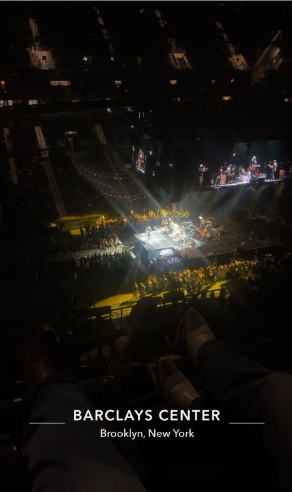The Birth of Movie Musicals
Movie musicals are by no means anything new. The first movie musical was “The Jazz Singer” released nearly a hundred years ago in 1927. More modern examples are “Wonka”, “Mean Girls” (2024), and “The Color Purple” (2023).
This questionable marketing tactic has led to mixed reactions. In recent years there seems to be a stigma that comes with musicals for general audiences. Audiences were confused and surprised when they went into these movies not knowing that they were musicals only to find these characters burst out into song.
The levels at which these studios have gone to hide the genre of their films vary from film to film. To give “The Color Purple” and “Mean Girls” credit. While they refrain from calling themselves musicals they still leave hints by including small segments of dance numbers and songs as background music. While “Wonka” completely excludes any songs or musical numbers from its marketing.
Mr. Brian Long grew up as a theater kid, participating in theater throughout high school and college. As a fan of both musicals and movies, he’s very passionate about the topic. “Musical movies were very prominent in the early days of Hollywood. I think what happened near the late 50-60s was that audiences grew tired and burnt out from them.”
He relates it to what’s happening now with modern box busters, specifically superhero movies given the over-saturation in that genre. “Eventually these big extravagant over-the-top movie musicals come out so frequently they make the audience burnt out. Then the studios turn to the younger independent directors whom they throw money to in order to figure out what audiences want. Which is what then creates this sort of shift in the 70s and 80s. Where these younger independent voices start to create films focused on realism, leaving them to push musicals off to the side.”
So why are Musicals looked down upon
While there have been some sporadic successful movie musicals to have come out. The prominent studio to capitalize on musicals has been Disney. This may be a leading factor in older general audiences dismissing musicals as childish.
Another, recent outlier that has a part in ruining the reputation of movie musicals is undoubtedly the 2019 “Cats” movie. With a star-studded cast, a 95 million dollar budget, and cat classes or something. The film became a worldwide laughingstock due to its questionable effects and horrendous CGI.
A string of box office flops that followed the reopening of theaters in 2021 sealed the deal for the way Hollywood advertises musicals going forward. 3 major musicals released that year. Comparing the budgets (not including any marketing cost) to the global box offices. “Dear Evan Hansen” lost 9 million dollars, “In the Heights” lost 10 million, and “West Side Story” lost 24 million. While this would seem to be a clear sign that audiences have no interest in musicals. It’s important to note that 2021 was a rough year for movies as a whole as theaters had recently re-opened at the time.
The most recent example of studios using this shady marketing tactic is with the upcoming “Wicked” film adaption. Only time will tell as to whether or not that performs well and what it may mean for future musical movies if it does.










